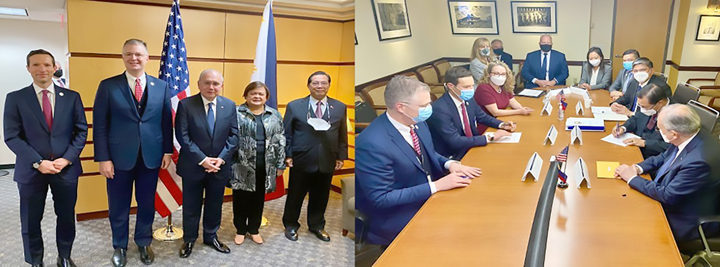
THE United States and the Philippines are keen to add more facilities to preposition US forces and defense materiel in the Philippines, the foreign and defense ministries of both countries said in a joint statement.
Philippine diplomatic and defense officials met in Washington D.C. for two days on November 15 and 16 and outlined a joint vision statement to reinvigorate the bilateral relations just three months after President Duterte resumed the Visiting Forces Agreement, which cloaks US soldiers coming to the Philippines with diplomatic immunity.
To complement the VFA, the Philippines also allowed the US to construct facilities and preposition defense assets inside Philippine military bases under the Enhanced Defense Cooperation Agreement (EDCA) in 2014.
The US has existing facilities inside these military bases — Antonio Bautista Air Base in Palawan, Fort Magsaysay in Nueva Ecija, Lumbia Air Base in Cagayan de Oro, and Mactan-Benito Air Base in Cebu.
Besides adding more US facilities, Manila and Washington also want to resume construction of US facilities in those bases.
“We intend to continue to implement infrastructure projects at current EDCA locations and explore additional sites for further development,” a part of the Joint Vision Statement for a 21st Century United States-Philippines Partnership reads.
The defense departments also committed to negotiate an agreement governing the manner by which both militaries can share intelligence and properly use equipment for joint use during combined military operations or training exercises.
“We intend to continue to build the capacity of the Philippine security forces, and prioritize concluding a General Security of Military Information Agreement [GSOMIA] in the next year to complement information-sharing and equipment modernization efforts,” their statement added.
Both countries noted the need to improve the defense capabilities of the AFP “given prevailing geopolitical tensions especially in the maritime areas of the Philippines”
—carefully omitting a specific threat but nonetheless impliedly referring to China’s growing expansion in the South China Sea.
“We intend to promote interoperability of the US and Philippine armed forces” which includes establishing a coordination center, developing a joint command and control for operations, and finishing the maritime “framework” to enable their soldiers to execute joint operations more effectively.
Security and defense cooperation activities such as education and training, capacity-building, interoperability and modernization of defense and security institutions, as well as conducting regular high-level visits and dialogues, will also be strengthened.
On the diplomatic front, both countries have pledged to build “an international coalition supporting the international-based maritime order” including holding a “Maritime Dialogue” next year.
“The United States and the Philippines express their support for compliance with the international law of the sea and are continuing activities and cooperation to exercise and support safety and freedoms of navigation, overflight, and other lawful uses of the sea in the South China Sea and around the world,” the two countries stated.
The US sided with the Philippine position that China cannot assert its maritime claim over Scarborough Shoal and Spratly Islands. It is one with the Philippines in saying that China’s “expansive maritime claims in the South China Sea are inconsistent with the international law of the sea.”
The Joint Statement was signed by Ambassador Jose Manuel G. Romualdez and Undersecretary of National Defense Cardozo M. Luna for the Philippine Government, and Assistant Secretary of State for East Asian and Pacific Affairs Daniel J. Kritenbrink and Assistant Secretary of Defense for Indo-Pacific Security Affairs Ely S. Ratner for the US Government, as Co-Chairs of the 9th BSD.
Aside from the Joint Vision Statement, both sides signed the Strategic Policy Guidance to the Mutual Defense Board-Security Engagement Board.
Joining the diplomatic and defense officials in the Philippine delegation were senior officials and subject-matter experts from the Departments of Agriculture, Finance, Foreign Affairs, Justice, National Defense, and Trade and Industry, as well as the Office of the President, Anti-Money Laundering Council, Armed Forces of the Philippines, and Philippine Nuclear Research Institute.

